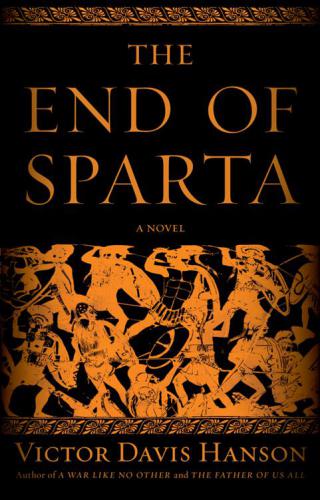
The End of Sparta
A Novel
کتاب های مرتبط
- اطلاعات
- نقد و بررسی
- دیدگاه کاربران
نقد و بررسی

August 22, 2011
Leading classicist Hanson (The Father of Us All) focuses on the Theban defeat of the renowned Spartan army in 371 B.C.E. The hero of the tale is the Theban general Epaminondas, a devotee of Pythagoras and a warrior with unconventional attitudes about warfare, life, and death. His unexpected choices—not to mention the Spartan underestimation of the Theban “pigs”—allow the Thebans to fulfill the prophecies of Sparta’s downfall, many of which focus on the farmer Mêlon (meaning “apple”), whose journey from reluctant soldier to enthusiastic liberator gives the novel its emotional heart. Battle scenes are conveyed in exacting detail; a glossary of names and numerous line diagrams help readers differentiate characters and envisage the sites of central dramas. Told in a somewhat elevated style that simultaneously honors and updates the rhetorical heights of classic Greek histories, Hanson’s novel is both old-fashioned and lively. Given his notable body of work, it’s no wonder that his first fiction effort is rich in authentic detail and narrated with a confident authorial voice. His vigorous narrative not only offers insight into arms and armor, but also into the hearts of the men who bore them.

October 1, 2011
Classicist, farmer and conservative commentator Hanson (The Soul of Battle, 1999, etc.) turns to fiction to tell the tale of Sparta's final days. Mêlon--his name means "apple" in Greek, on which a bit of prophecy at the beginning of the novel turns--is a farmer from the district of Thespiai who lays down his plowshare and picks up a sword when the need arises. Epaminondas, the commander of the Theban forces, is mighty glad of it, too, for when Mêlon arrives at the battlefield of Leuktra, he is the moral equivalent of 1,000 men: "The presence of Mêlon, the apple, would win over the hesitant horsemen and the scared farmers and the ignorant tanners and potters as well." The slight against tanners and potters notwithstanding, Mêlon is a fellow who knows his business on the battlefield, a philosophical soul who reflects that war "is the great torch that brings such heat and light to everything and everyone." Yet, like some Stonewall Jackson of old, he isn't quite certain about Epaminondas' program of freeing the slaves--the helots, or "seized ones"--of Sparta, which seems a touch radical to him. No matter: Mêlon is a good soldier, and he eventually buys into the program. Along the way, he meets with all manner of characters who help serve Hanson's purpose of delivering genuine history within the Trojan horse of an action-packed war story, including a prostitute who doesn't have a heart of gold, but who could easily afford to buy one with her fabulous wealth; Epaminondas, ambitious and shrewd, with a gift for poetry; and various Spartans, servants of an evil empire about to go up in a cloud of smoke. A worthy historical re-creation: Hanson has high-minded purposes in depicting the triumph of democracy over dictatorship, but there's plenty of exciting swordplay, too.
(COPYRIGHT (2011) KIRKUS REVIEWS/NIELSEN BUSINESS MEDIA, INC. ALL RIGHTS RESERVED.)

September 1, 2011
The history of the Theban general Epaminondas and the liberation of 100,000 Messenian helots (slaves) in 369 B.C.E. is often overlooked. Athens and Sparta were the great powers of their day--Athens for its center of learning and democracy and Sparta for its military prowess. Thebes, on the other hand, was an agrarian state, the breadbasket of Greece, and as such was disdained by its southern neighbors. Making his fiction debut, historian Hanson, praised for his in-depth analyses of the early history of the Greek city-states in The Father of Us All and A War Like No Other, tells the story of Epaminondas and the fall of Sparta at the Battle of Leuktra through the eyes of Melon, a farmer-turned-soldier. VERDICT Hanson suffers a bit from first-novelitis. While he excels at depicting battle strategies and ancient armaments, his characters are less well developed--their motives and passions not fully revealed. Stilted dialog fails to advance the plot. However, for readers who enjoy works set in this time period, such as Steven Pressfield's Gates of Fire (Sparta) and Tides of War (Athens), this may be a welcome look at a less-well-known Greek city-state.--Jane Henriksen Baird, Anchorage P.L., AK
Copyright 2011 Library Journal, LLC Used with permission.

























دیدگاه کاربران